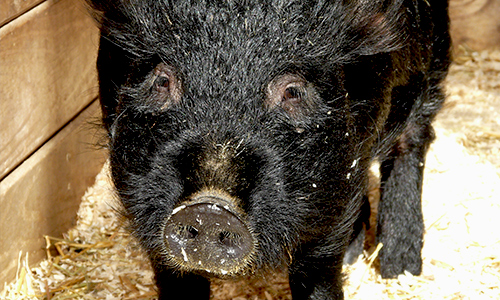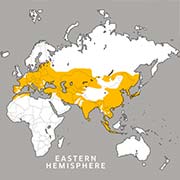Guinea hog
Sus scrofa

Save
About the Guinea hog

Geographic Range:

Class: Mammalia
Order: Artiodactyla
Family: Suidae
Genus: Sus
Species: scrofa
Guinea hogs have hairy coats, upright ears and a curly tail. Weighing between 100 and 300 pounds, hogs have thick, insulating fat on their body to keep warm. Also known as "yard pigs," guinea hogs are domesticated animals known for their easy-going temperaments.
Guinea Hog Facts
Appearance:
A guinea hog is a medium-sized pig with black bristly hair and a curly tail. They have a blocky stout body and a slightly arched back. Their eyes are set forward on the face and they have medium-sized erect ears.
Size:
Weight: 100 to 300 pounds
Height: 1.8 to 2.3 feet tall
Length: 3.8 to 4.7 feet long
Diet:
Guinea hogs are omnivores and will eat a wide variety of plants and small animals. They're often kept as a pest control animal for their ability to eat mice and rats.
Reproduction:
Guinea hogs don't have a set breeding season. After a 115-120 day gestation, mothers give birth to up to 10 piglets who reach sexual maturity around 2 years of age.
Behavior:
Guinea hogs are good-tempered animals that have excellent mothering skills. They're gregarious and live in large groups. They have a flexible snout and a good sense of smell that they use to root around to find food. They're unable to sweat so they roll in mud to cool down.
Habitat/Range:
Guinea hogs are a domestic species originally from West Africa. Now they have spread through farms in Africa, Europe and the United States.
Median Life Expectancy:
Their captive life expectancy has been recorded up to 10 to 15 years.
Threats:
Compared to more common breeds of hog, the guinea hog is an endangered breed due to its small size. More common breeds of hog are being kept more often by farmers and several variations of the guinea hog breed have already gone extinct.
You Can Find This Animal in the Franklin Farm
You might also like
At Franklin Park Zoo:
At Stone Zoo:

